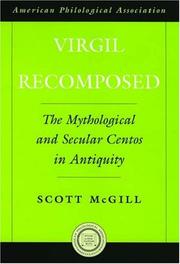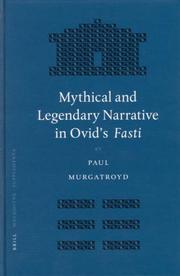| Listing 1 - 3 of 3 |
Sort by
|
Book
ISBN: 9789042929111 9042929111 Year: 2013 Volume: 4 Publisher: Leuven : Peeters,
Abstract | Keywords | Export | Availability | Bookmark
 Loading...
Loading...Choose an application
- Reference Manager
- EndNote
- RefWorks (Direct export to RefWorks)
This collection of essays brings innovative perspectives to the study of ancient mythography, that is, the writings of Greeks and Romans about their own mythical traditions. It treats a range of sources from the beginnings of myth criticism in the 5th century BCE to the end of antiquity in the 5th century CE, highlighting mythography's centrality to ancient views of myth and moving beyond seeing mythographic texts as valuable primarily for the preservation of details about traditional stories. Important individual mythographers are treated (e.g., Ps.-Apollodorus and Hyginus), but throughout there is an emphasis on the connections of mythography with more literary genres, such as epic, and more prestigious prose genres, such as historiography and geography. This makes the volume of interest for those who work on myth in Greek and Roman society, but also for anyone working on ancient intellectual history more broadly, including those who study rhetoric, education, literary composition, art and ancient scholarly traditions.
Greek mythology in literature --- Griekse mythologie in de literatuur --- Mythologie [Griekse ] in de literatuur --- Mythologie [Romeinse ] in literatuur --- Mythologie grecque dans la littérature --- Mythologie romaine dans la littérature --- Mythology [Greek ] in literature --- Mythology [Roman ] in literature --- Mythology, Classical --- Mythologie ancienne --- Antiquité --- --Mythe --- --Mythologie antique --- --Mythology, Greek --- Mythology, Roman --- Mythology, Greek, in literature --- Mythology, Roman, in literature --- Historiography --- Mythology, Greek --- Classical literature --- History and criticism --- Congresses --- Mythe --- Mythologie antique --- Mythology, Greek - Historiography - Congresses --- Mythology, Roman - Historiography - Congresses --- Mythology, Greek, in literature - Congresses --- Mythology, Roman, in literature - Congresses

ISBN: 0195175646 9780195175646 0199789339 0190291885 9786610428267 1423756495 1280428260 0198039107 1602565201 Year: 2005 Volume: 48
Abstract | Keywords | Export | Availability | Bookmark
 Loading...
Loading...Choose an application
- Reference Manager
- EndNote
- RefWorks (Direct export to RefWorks)
Mythologie [Romeinse ] in literatuur --- Mythologie romaine dans la littérature --- Mythology [Roman ] in literature --- Centos --- Epic poetry, Latin --- Mythology, Roman, in literature. --- History and criticism. --- Adaptations --- Virgil --- Appreciaton --- Parodies, imitations, etc. --- Mythology, Roman, in literature --- Latin epic poetry --- Latin poetry --- Cento verse --- Collage poems --- Mosaic poems --- Patchwork poems --- Patchwork poetry --- Poetry --- Pasticcio --- History and criticism --- Adaptations&delete& --- Vergil --- Virgile --- Virgilio Máron, Publio --- Virgilius Maro, Publius --- Vergili Maronis, Publius --- Appreciation --- Vergilius Maro, Publius --- Rome --- Epic poetry [Latin ] --- Virgilius Maro, Publius, --- Virgilio Marone, P., --- Vergilīĭ, --- Virgile, --- Vergílio, --- Wergiliusz, --- Vergilīĭ Maron, P. --- Vergilīĭ Maron, Publīĭ, --- Verhiliĭ Maron, P., --- Vergil, --- Virgilio, --- Virgilīĭ, --- Virgilius Maro, P., --- Virgil Maro, P., --- ווירגיל, --- וירגיליוס, --- ורגיליוס, --- מרו, פובליוס ורגיליוס, --- فرجيل, --- Pseudo-Virgil, --- Pseudo Virgilio, --- Virgilio Marón, Publio, --- Bhārjila, --- Vergilius Maro, P. --- Vergilius --- Virgilio Marone, P. --- Vergilīĭ --- Vergílio --- Wergiliusz --- Vergilīĭ Maron, Publīĭ --- Verhiliĭ Maron, P. --- Virgilio --- Virgilius Maro, P. --- Virgil Maro, P. --- Pseudo-Virgil --- Pseudo Virgilio --- Virgilio Marón, Publio --- Bhārjila --- Marone, Publio Virgilio

ISBN: 9004143203 9789047407225 9047407229 1433707527 9781433707520 9789004143203 1280867817 9781280867811 9786610867813 661086781X Year: 2005 Volume: 263 Publisher: Leiden: Brill,
Abstract | Keywords | Export | Availability | Bookmark
 Loading...
Loading...Choose an application
- Reference Manager
- EndNote
- RefWorks (Direct export to RefWorks)
This book analyses the mythical and legendary narratives in Ovid's Fasti as narrative and concentrates on the neglected literary aspects of these stories. It combines traditional tools of literary criticism with more modern techniques (taken especially from narratology and intertextuality). From a narratological viewpoint it covers important features such as aperture, closure, characterization, internal narrators, description, space, time and cinematic technique. On the intertextual level it examines the narratives' complex relationship with Virgil, Livy and Ovid's own earlier works. Recent criticism on the Fasti has addressed various elements (religious, historical, political, astronomical et cetera), but detailed narrative study has been wanting. This book fills that gap, to provide a more informed and balanced appreciation of this multifaceted poem aimed at classicists and literary critics in general (for whom all the Latin is translated).
Didactic poetry, Latin --- Fasts and feasts in literature. --- Legends in literature. --- Mythology, Roman, in literature. --- Narration (Rhetoric) --- Rhetoric, Ancient. --- History and criticism. --- History --- Ovid, --- Knowledge --- Mythology. --- Rome --- In literature. --- Ancient rhetoric --- Antieke retoriek --- Fasts and feasts in literature --- Feesten [Godsdienstige ] in de literatuur --- Fêtes religieuses dans la littérature --- Godsdienstige feesten in de literatuur --- Legenden in de literatuur --- Legends in literature --- Légendes dans la littérature --- Mythologie [Romeinse ] in literatuur --- Mythologie romaine dans la littérature --- Mythology [Roman ] in literature --- Retoriek [Antieke ] --- Retoriek van de Oudheid --- Rhetoric [Ancient ] --- Rhétorique ancienne --- Rhétorique de l'Antiquité --- Rome -- Dans la littérature --- Rome -- In de literatuur --- Rome -- In literature --- Rome dans la littérature --- Rome in de literatuur --- Rome in literature --- Poésie didactique latine --- Mythologie romaine dans la littérature --- Fêtes religieuses dans la littérature --- Légendes dans la littérature --- Rhétorique ancienne --- Histoire et critique --- Rome dans la littérature --- Mythology, Roman, in literature --- Rhetoric, Ancient --- Classical languages --- Greek language --- Greek rhetoric --- Latin language --- Latin rhetoric --- History and criticism --- Rhetoric --- Nasó, P. Ovidi, --- Naso, Publius Ovidius, --- Nazon, --- Ouidio, --- Ovide, --- Ovidi, --- Ovidi Nasó, P., --- Ovidiĭ, --- Ovidiĭ Nazon, Publiĭ, --- Ovidio, --- Ovidio Nasón, P., --- Ovidio Nasone, Publio, --- Ovidios, --- Ovidiu, --- Ovidius Naso, P., --- Ovidius Naso, Publius, --- Owidiusz, --- P. Ovidius Naso, --- Publiĭ Ovidiĭ Nazon, --- Publio Ovidio Nasone, --- Ūvīd, --- אוביד, --- Ovid --- Mythology --- Didactic poetry [Latin ] --- To 1500 --- Didactic poetry, Latin. --- Literature. --- Narrative (Rhetoric) --- Narrative writing --- Discourse analysis, Narrative --- Narratees (Rhetoric) --- Myths --- Legends --- Religion --- Religions --- Folklore --- Gods --- Myth --- Belles-lettres --- Western literature (Western countries) --- World literature --- Philology --- Authors --- Authorship --- Latin didactic poetry --- Latin poetry --- Fasti (Ovid) --- Fastes (Ovid) --- Tempora cum causis Latium digesta per annum (Ovid) --- Rome (Empire) --- Rim --- Roman Empire --- Roman Republic --- Romi (Empire) --- Byzantine Empire --- Italy --- Didactic poetry, Latin - History and criticism. --- Narration (Rhetoric) - History - To 1500. --- Ovid, - 43 B.C.-17 or 18 A.D. - Fasti. --- Ovid, - 43 B.C.-17 or 18 A.D. - Knowledge - Mythology. --- Rome - In literature. --- Ovid, - 43 B.C.-17 or 18 A.D.
| Listing 1 - 3 of 3 |
Sort by
|

 Search
Search Feedback
Feedback About UniCat
About UniCat  Help
Help News
News